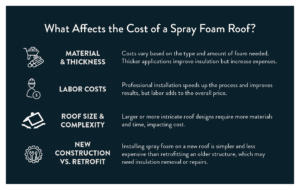![]() Phoenix, Arizona: 602-932-1623
Phoenix, Arizona: 602-932-1623
![]() Phoenix, Arizona: 602-833-1185
Phoenix, Arizona: 602-833-1185

February 20, 2025
Your roof takes a beating in Phoenix’s relentless heat. A spray foam roof doesn’t just protect—it seals, insulates, and helps cut cooling costs.
The challenge? A spray foam roof is only as good as its installation. Without proper preparation and application, the result can be weak adhesion, poor insulation, and costly repairs.
So, what does a quality spray foam installation actually involve? From surface preparation to final inspection, here’s a step-by-step look at the process behind a roof that lasts.
A well-installed spray foam roof does more than insulate—it strengthens and protects. Achieving a smooth, durable finish requires a careful process, from preparing the surface to applying the final protective layer. Here’s how each step comes together to create a roof built to last.
A clean surface is the foundation of a successful spray foam application. Contractors start by sweeping away loose debris and pressure-washing the roof to remove dirt and buildup. Any moisture present must dry completely before moving forward.
This phase also reveals hidden issues. Weak spots, cracks, and trapped moisture can compromise the installation if left unaddressed. Identifying these issues early prevents problems down the line and helps create a solid base for a strong, long-lasting spray foam application.
Any structural weaknesses must be fixed before applying spray foam. Small cracks and uneven areas are patched to create a smooth base. Reinforcing these spots prevents gaps or uneven coverage.
If the existing roof has extensive damage or multiple layers of old material, removal may be necessary. Damaged insulation must also be replaced to avoid long-term performance issues.
With every weak spot reinforced, the surface is now ready to support a smooth foam layer.
The installation begins with a liquid polyurethane mixture sprayed evenly across the roof. As it expands, it forms a dense, insulating layer that molds to the surface.
Unlike traditional materials, spray foam creates a continuous barrier. It seals cracks, fills irregularities, and bonds tightly to the roof, preventing leaks. The result is a solid, protective layer that provides insulation and structural support.
As the foam expands and solidifies, the next step is locking in that protection with a durable topcoat.
Exposure to sunlight can degrade spray foam over time. To prevent this, a topcoat of silicone or acrylic is applied.
This layer shields the roof from Phoenix’s intense heat and unpredictable weather. It also improves water resistance, reducing the risk of pooling and moisture damage.
With the protective coating in place, the roof is stronger and more resilient. Now, it’s time for a final check.
Once the coating is applied, technicians conduct a final review. They check for uniform coverage and make any necessary touch-ups.
The curing process happens fast. Within hours, the foam and coating solidify into a durable, watertight surface. By the end of the day, the roof is walkable and fully set.
With the installation complete, the focus shifts to simple maintenance steps that keep the roof performing for decades.
Spray foam roofing requires minimal upkeep, but periodic inspections help extend its life. A professional checkup every few years can identify small issues before they escalate.
Recoating every 10–15 years helps maintain durability, keeping the foam protected from UV exposure and weathering.
Repairs are straightforward. Small cracks or worn areas can be resealed without major reconstruction. With proper maintenance, a spray foam roof can last up to 35 years, making it a smart, long-term investment.
Installing a spray foam roof may seem straightforward, but achieving a long-lasting result requires skill and the right equipment. While small patch jobs can be done by homeowners, a full installation is best left to professionals.

For long-term reliability and savings, a professionally installed spray foam roof lasts longer, performs better, and often includes warranty protection. Understanding key cost factors also helps homeowners make an informed decision.
Several factors influence the cost of a spray foam roof. The type and thickness of the foam, labor costs, and the complexity of the roof structure all play a role. New construction installations tend to be more straightforward, while retrofitting an older roof may require additional prep work.

A quality installation starts with choosing the right roofing company. Researching companies, reading reviews, and asking for referrals can help narrow down options. Comparing multiple quotes gives insight into pricing and available services, while checking licensing, certifications, and warranty options confirms a company’s credibility.
Spray foam roofing requires skill and precision. At Diversified Roofing, we bring years of experience to every project. As specialists in Phoenix roofing, we apply spray foam with care to create a long-lasting, high-performance roof.
Arizona’s extreme heat and sudden weather shifts require a roofing system built to withstand the elements. Our team understands these demands and installs roofs designed for durability, energy savings, and low maintenance.
Learn more about our spray foam roofing services and how they can improve the protection and efficiency of your home.